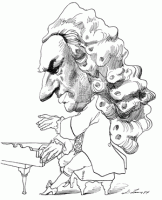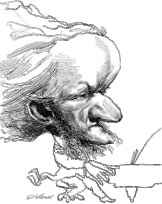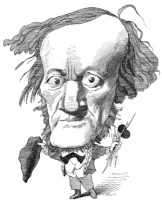More from the Review
Subscribe to our Newsletter
Best of The New York Review, plus books, events, and other items of interest
Advertisement
More from the Review
Subscribe to our Newsletter
Best of The New York Review, plus books, events, and other items of interest
Joseph Kerman is emeritus professor of music at the University of California, Berkeley. He began writing music criticism for The Hudson Review in the 1950s, and is a longtime contributor to The New York Review of Books and many other journals. His books include Opera as Drama (1956; new and revised edition 1988), The Beethoven Quartets (1967), Contemplating Music (1986), Concerto Conversations (1999), and The Art of Fugue (2005).
The Voice of Masters
Choral Masterworks: A Listener's Guide
by Michael Steinberg
October 20, 2005 issue
That Old Labyrinth Song
The Maze and the Warrior: Symbols in Architecture, Theology, and Music
by Craig Wright
June 24, 2004 issue
The Full Monte
L'incoronazione di Poppea
conducted by Christophe Rousset, directed by Pierre Audi
Il ritorno d'Ulisse in patria
conducted by William Christie, directed by Adrian Noble
Orfeo
conducted by Jane Glover, directed by Diane Paulus
June 13, 2002 issue
Bayreuth Blues
The Wagners: The Dramas of a Musical Dynasty
by Nike Wagner, translated from the German by Ewald Osers and Michael Downes
August 9, 2001 issue
The Miracle Worker
Mozart
by Peter Gay
The Life of Mozart
by John Rosselli
Mozart in Revolt: Strategies of Resistance, Mischief and Deception
by David Schroeder
Mozart: A Cultural Biography
by Robert W. Gutman
March 23, 2000 issue
Beethoven and the Big Change
Beethoven's Concertos: History, Style, Performance
by Leon Plantinga
Beethoven: Piano Concertos Nos. 1 & 2, Piano Concertos Nos. 3 & 4, Piano Concerto No. 5 "Emperor," and Choral Fantasy Choir
fortepiano Robert Levin. the Orchestre Révolutionnaire et Romantique, and the Monteverdi, directed by John Eliot Gardiner
June 24, 1999 issue

Bach’s Greatest Hit
Bachanalia: The Essential Listener's Guide to Bach's 'Well-Tempered Clavier'
by Eric Lewin Altschuler
October 6, 1994 issue
Mozart à la Mode
Mozart, Piano Concertos No. 20 in D minor, K. 466, and No. 21 in C, K. 467 conducted by John Eliot Gardiner
with Malcolm Bilson, fortepiano, and English Baroque Soloists,
Mozart, Piano Concertos No. 22 in E flat, K. 482, and No. 23 in A, K. 488 conducted by John Eliot Gardiner
with Malcolm Bilson, fortepiano, and English Baroque Soloists,
Mozart, Piano Concertos No. 25 in C, K. 503, and No. 26 in D, K. 537 conducted by John Eliot Gardiner
with Malcolm Bilson, fortepiano, and English Baroque Soloists,
Mozart and Schnabel, Vol. II, Piano Concerto No. 20
with the Philharmonia Orchestra, conducted by Walter Susskind
Mozart and Schnabel, Vol. II, Piano Concerto No. 21
with the London Symphony Orchestra, conducted by Sir Malcolm Sargent
Mozart and Schnabel, Vol. II, Sonata No. 12 in F, K. 332
with the London Symphony Orchestra, conducted by Sir Malcolm Sargent
Mozart, Piano Concerto No. 26 in D, K. 537, and Rondos, K. 382 and 386
with Murray Perahia, piano and, the English Chamber Orchestra.
Mozart, Piano Concertos No. 23 in A, K. 488, and No. 27 in B flat, K. 595
with Vladimir Ashkenazy, piano and, the Philharmonia Orchestra.
May 18, 1989 issue
The Residue of Genius
1791: Mozart's Last Year
by H.C. Robbins Landon
Mozart: Studies of the Autograph Scores
by Alan Tyson
August 18, 1988 issue

Wagner Goes West
Der Ring des Nibelungen
by Richard Wagner. produced by the San Francisco Opera, June 1985
Die Walküre, Siegfried, Götterdämmerung
by Nicholas John
August 15, 1985 issue

Wagner and Wagnerism
Richard Wagner: His Life, His Work, His Century
by Martin Gregor-Dellin, translated by J. Maxwell Brownjohn
The New Grove Wagner
by John Deathridge and Carl Dahlhaus
The Fertilizing Seed: Wagner's Concept of the Poetic Intent
by Frank W. Glass
Wagner's Siegfried: Its Drama, History, and Music
by Patrick McCreless
I Saw the World End: A Study of Wagner's Ring
by Deryck Cooke
Wagner and Aeschylus: The Ring and the Oresteia
by Michael Ewans
Kingdom on the Rhine: History, Myth and Legend in Wagner's Ring
by Nancy Benvenga
Staging Wagnerian Drama
by Adolphe Appia, translated with an introduction by Peter Loeffler
My Life
by Richard Wagner, translated by Andrew Gray, edited by Mary Whittall
Wagner Rehearsing the 'Ring': An Eye-Witness Account of the Stage Rehearsals of the First Bayreuth Festival
by Heinrich Porges, translated by Robert L. Jacobs
In Search of Wagner [Versuch über Wagner]
by Theodor Adorno, translated by Rodney Livingstone
Tétralogies
Wagner, Boulez, Chéreau: Essai sur l'infidélité
by Jean-Jacques Nattiez
Dichtungen und Schriften: Jubiläumsausgabe in Zehn Bänden
by Richard Wagner, edited by Dieter Borchmeyer
The Opera Quarterly, Commemorative Wagner Issue, volume 1, no. 3 (Autumn 1983)
Three Wagner Essays
by Richard Wagner, translated by Robert L. Jacobs
December 22, 1983 issue
Verdi’s Hit Parade
The Operas of Verdi, Vol. 3: From Don Carlos to Falstaff
by Julian Budden
March 4, 1982 issue
Subscribe and save 50%!
Read the latest issue as soon as it’s available, and browse our rich archives. You'll have immediate subscriber-only access to over 1,200 issues and 25,000 articles published since 1963.
Subscribe now
Subscribe and save 50%!
Get immediate access to the current issue and over 25,000 articles from the archives, plus the NYR App.
Already a subscriber? Sign in